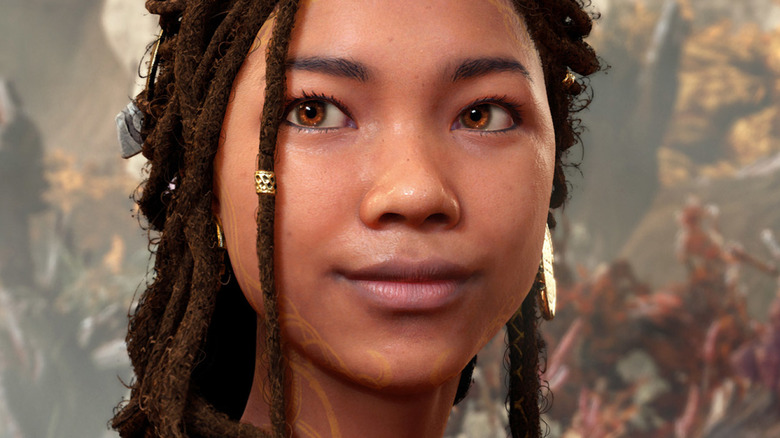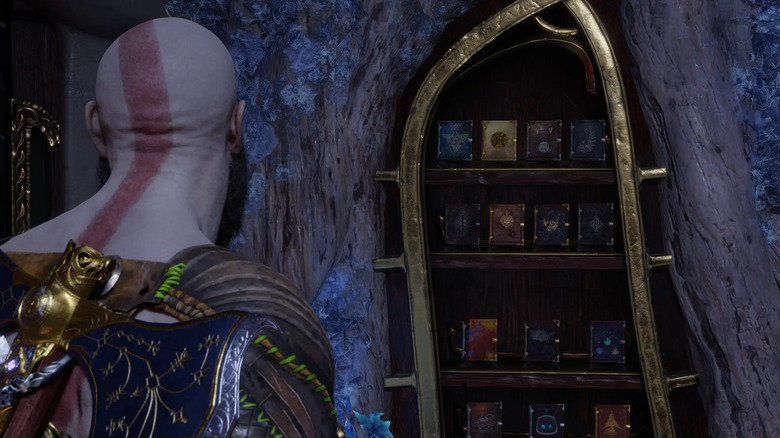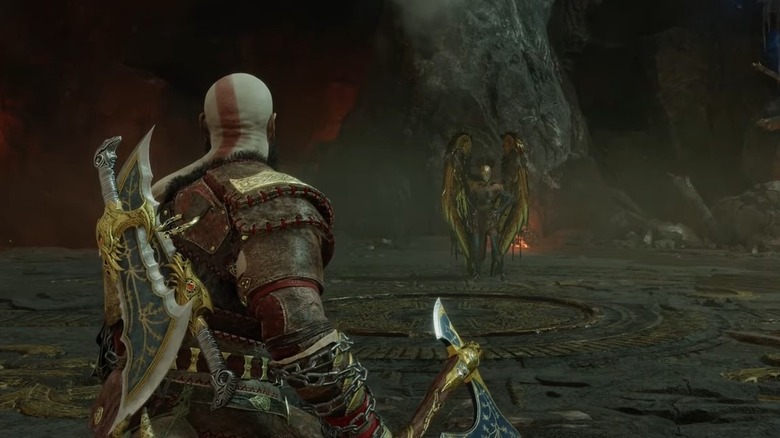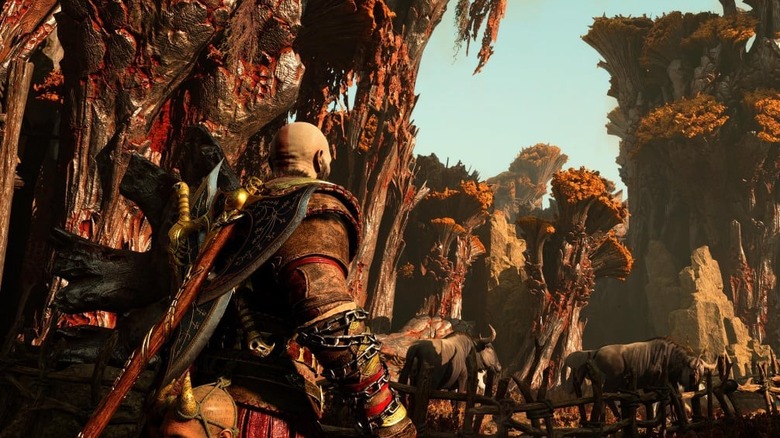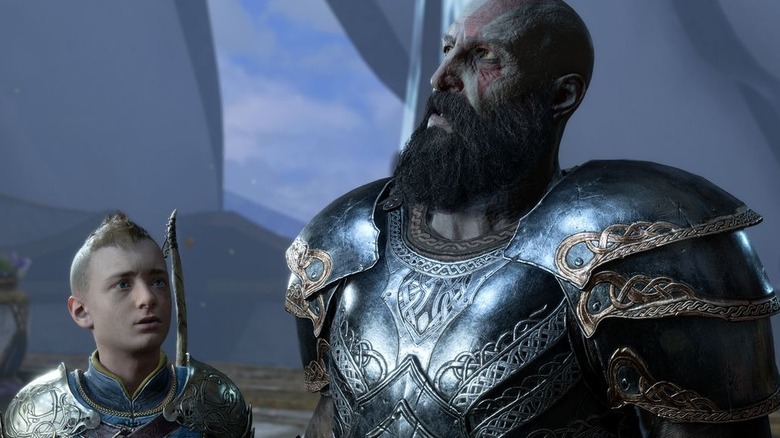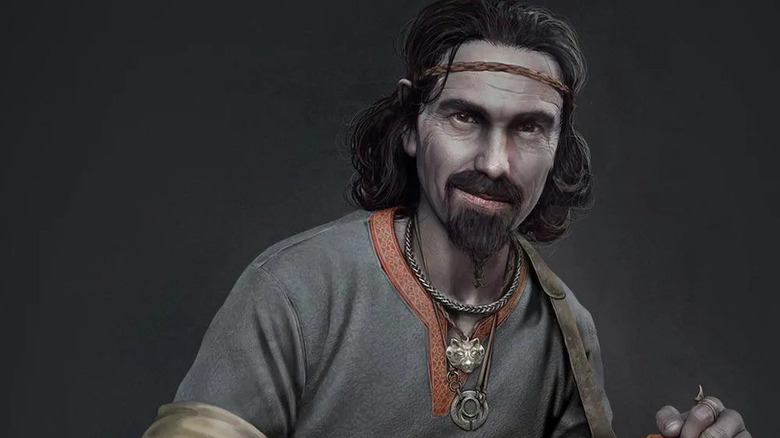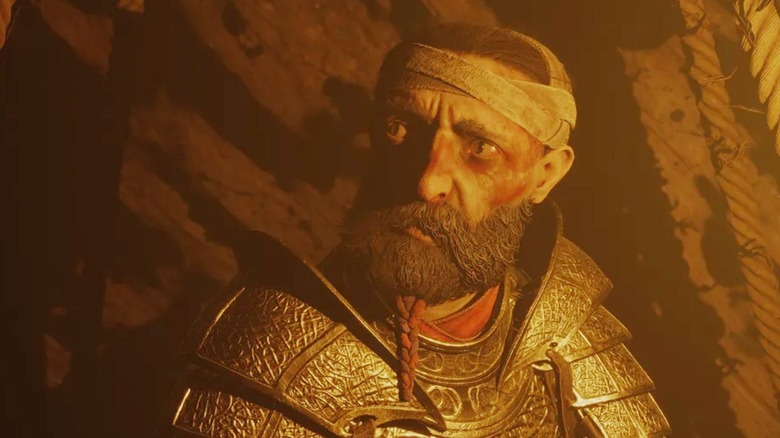Small Details Only Big Fans Noticed In God Of War Ragnarok
"God of War Ragnarok" has finally battled its way onto store shelves, allowing fans around the world to dive into the game. While players go through the game's emotional story and master its combat mechanics, many are enjoying the act of exploring every nook and cranny of the nine realms. The bar for easter eggs in "Ragnarok" has been set pretty high, considering just how many great easter eggs were found in 2018's "God of War." And given how much larger the worlds of "Ragnarok" are than its predecessor, there is plenty of room for players to delve into the many small details hidden by the developers at Sony Santa Monica.
Luckily, players have already started finding some great secrets spread throughout all of "Ragnarok." These are not just limited to callbacks to previous games in the series, either. There are references to other games, plenty of hidden cutscenes, and some subtle nods for the most dedicated of fans to pick up. If you've given up looking for them, want to know where to check for easter eggs, or are just beginning your journey and are curious about where it may lead you, read on.
Beware of major spoilers ahead for "God of War Ragnarok."
The PlayStation family
One of the earliest secrets that dedicated players started finding was a series of poems written by the Norse god of travel, Kvasir. Upon reading the poems, however, players started realizing that they aren't actually about anything in Norse mythology. Instead, each book is a cheeky reference to another one of PlayStation's first-party titles.
Each book has an image on the cover that hints at which game it is referencing, as well as a title that replaces the game's name with synonyms. For example, "Horizon Zero Dawn" is instead called "The Sunrise of Nothingness." Each of the books then also includes a poem referencing the world and stories of the game, making it a great treat for die-hard PlayStation fans. The poem titles and games they are referencing are:
- The Sunrise of Nothingness – "Horizon Zero Dawn"
- Large Society Ground Orb, The Performance – "MLB The Show"
- We Who Remain, Part The Second – "The Last of Us"
- Tool and Bang – "Ratchet and Clank"
- Afterlife Abandonment – "Death Stranding"
- Visions After Rest – "Dreams"
- Spirits Within Walls – "Concrete Genie"
- Celestial Construct – "Astro Bots"
- Upon Pursuing A Place Not Marked on Maps – "Uncharted"
- Trip – "Journey"
- Eastern Spector – "Ghost of Tsushima"
- An Organization: In The Future – "The Order 1886"
- Sanguinity – "Bloodborne"
- The Dead Do Not Ride – "Days Gone"
While some of these titles go a little bit out of their way to match the original games, others are hilariously simple. Either way, they make for a fun discovery for eagle-eyed fans of PlayStation's extensive catalogue.
An embarrassing part of Kratos' past
Kratos is no stranger to combat and violence, that much is made clear throughout his series of games. Throughout "Ragnarok," Mimir and Atreus both bring up stories of Kratos' past fights, although he is reticent to talk about them. Only one of them, however, causes embarrassment for Kratos. The exchange comes up later in the game, when Mimir brings up a tournament that Kratos fought in long ago. Although Kratos quickly puts an end to the conversation, there are clues that it is an easter egg pointing toward Kratos' involvement in the 2012 platform fighter "PlayStation All-Stars."
The hints come in the form of Mimir referencing other characters featured in "PlayStation All-Stars." He says that the tournament featured Kratos fighting against "beasts, scoundrels, princesses, the undead, automatons, and history's greatest musician." The beast seems to be Sly Cooper, the scoundrel is likely Nathan Drake, the princess is Fat Princess, the undead is Sir Daniel from "MidiEvil," the automaton is Big Daddy from BioShock, and the greatest musician is none other than Parappa the Rapper. Now that's crossover appeal.
The new Valkyrie Queen
The Valkyrie fights were some of the hardest in all of "God of War," culminating in the game's most challenging boss fight: the Valkyrie Queen Sigrún. The Valkyries are back in "God of War Ragnarok," with players having to fight two of them during the main campaign. Freya explains to Kratos that most of the Valkyrie in the game are not as powerful as the ones in the previous game, because they are newer replacements who recently adopted the mantle in the name of Odin. The new Valkyrie Queen Gná, however, is much more powerful than any of the Valkyries in the previous title.
The fight with Gná is very challenging, as she employs a move set filled with moves that are completely unique to her in the game. To face her, players first have to kill all of the other Valkyries, then find one of the Musphelheim Seed Halves by completing the Crucible Favour. This will open a long path to Gná. Once players head down that path, they'll come face-to-face with Gná in an absolute juggernaut of a secret boss encounter.
It seems the loss of Sigrún might have driven Gná mad, given how much more vicious she is when compared to every other enemy in the game.
Return to Jotunheim
After finishing the main story, Kratos can travel to Jotunheim with Freya, allowing her to see the realm in full for the very first time. Doing so also allows players to interact with Angrboda to learn how she and Atreus have gotten along living in the realm of the giants. The region is absolutely beautiful to explore, and there are a lot of hidden details and interactions for players to find scattered throughout.
One of these interactions sees Kratos walking over to a sleeping and massive Fenrir to pet him. Another involves Angrboda telling Kratos about how she has been teaching Atreus to paint, but that he needs more discipline before he can start producing better pieces. Kratos responds to this remark by saying that he likes her. Journeying to the realm with Freya also allows her to speak to Angrboda, which offers some more fun interactions for fans of the game's wonderful cast of characters.
Kratos' guilt
In the very first "God of War," Kratos fought a Hydra. After the boss fight, Kratos entered the Hydra's body to find a boat captain with a key that Kratos needed hanging around his neck. The boat captain thanked Kratos for saving him, but then Kratos took the key and let the boat captain fall to his death. Kratos has certainly come a long way since then, but this cold-blooded moment has become a meme among the "God of War" fan community. Though it's been years since that fateful battle, there have been nods to the doomed Ship Captain in a few of the sequels, including "Ragnarok."
This reference can be found in a journal entry made by Kratos, in which he admits feeling regret regarding his actions in that infamous cutscene. Not only is this a fun nod for the most dedicated of series fans, but it also illustrates just how much Kratos has grown as a protagonist in the time since. The newest "God of War" games greatly transformed Kratos into a more well-rounded character, and this small easter egg is a shining example of how the studio managed to use the original trilogy to motivate Kratos' development in interesting ways.
Ratatoskr's chime
During the main story in "Ragnarok," players meet up with Ratatoskr. In Norse mythology, Ratatoskr is a squirrel who carries messages up and down the World Tree. When Kratos needs to speak to Ratatoskr in "Ragnarok," he is able to throw his axe at wind chimes hanging from a branch to summon him. However, fans have found that there is some hidden dialogue for players who just can't get enough of ringing the chimes.
If players continue to ring the chimes, Ratatoskr will first respond by trying to tell Kratos that the chimes are just meant to be used to summon him and that ringing them while he is already there does nothing. He then transitions to trying to make jokes about it with Kratos. If players still persist, Ratatoskr says that he knows Kratos is trying to get a rise out of him, and that it isn't going to work. That ends up not being true, however. If players continue ringing the chimes past the point of common sense, Ratatoskr breaks and yells at Kratos, telling him to stop. The furry fellow seems to realize who he's talking to and quickly apologizes.
The hidden composer
While traveling across the realms, players will eventually come to a town of dwarves with a tavern at its center. In that tavern there is a dwarf lightly playing an instrument. When approached, he talks with Kratos and Atreus regarding their mission at the time. He also asks Kratos to allow him to finish a new song that he was inspired to compose. He tells the God of War that if he is going to kill him, he doesn't want to die with the song still in his head.
#GodofWarRagnarok composer @bearmccreary adds a new credit to his name.
Tomorrow, on November 9th, you’ll not only be able to hear Bear’s incredible score throughout your adventure â€" you’ll also be able to meet him ⁱⁿ⁻ᵍᵃᵐᵉ!
Introducing Ræb 🎵 pic.twitter.com/na6374VNbV
— Santa Monica Studio â€" God of War Ragnarök (@SonySantaMonica) November 8, 2022
Fans that are very familiar with the development team behind "Ragnarök," however, may find the dwarf very familiar. This is because he is actually played by the composer of both of the newest "God of War" games, Bear McCreary. The composer lent not only his face but also his vocal talents to the character, which is a great way to immortalize the composer in the series in a more forward-facing way (literally).
A sudden change in Sindri
Sindri and Brok were both breakout fan favorite characters in "God of War." As players progressed through the game, they frequently ran into the two blacksmithing brothers to learn more about them and upgrade their gear. The two characters stand in wonderful opposition of one another. Sindri is a neurotic germaphobe that is hesitant to work on dirty gear and always wants Kratos and Atreus to clean items before handing them to him. On the other hand, Brok is a gruff and potty-mouthed smith who cares little for anything outside of the art of smithing.
Players have noticed, however, that Sindri's personality changes after Odin kills Brok. The change comes in the form of Sindri not caring anymore about germs or getting dirtied. Not only does he no longer mention it to Kratos and son, but when his own armor gets splattered with blood, he doesn't clean it. Even after time passes and Sindri attends Brok's funeral, he still has the blood on him. It's unclear whether this means he's gotten over his phobia or he's falling into a depression, but it is a very interesting (and subtle) way for the sequel to develop his character — and fans are much more likely to notice.
The true Tyr is much stronger
When Atreus and Kratos meet the man they believes to be Tyr, the Norse God of War, they find Tyr to be a broken man, barely able to hold his head up. After years of imprisonment and psychological torture, Tyr can barely speak above a whisper or stand on his own two feet. What they do not realize is that this Tyr is actually Odin posing as the imprisoned God of War, and his deception leads to a deadly encounter with Kratos and his friends.
Much later in the game, after completing the main story, players can find the real Tyr in a prison cell. Unlike the fraud encountered earlier, this Tyr immediately rises to his feet and joyfully greets Freya and Kratos. He seems conflicted to hear of the death of Odin and the downfall of the Aesir, but nevertheless carries himself in a manner that suggests his imprisonment did nothing to damage his spirit. He stands up straight and speaks in full voice, a far cry from the impression Odin did of him.
As pointed out by some fans, this would suggest that Odin was essentially mocking Tyr while he pretended to be him. The true Tyr is much stronger and more welcoming than Odin could ever approximate.

